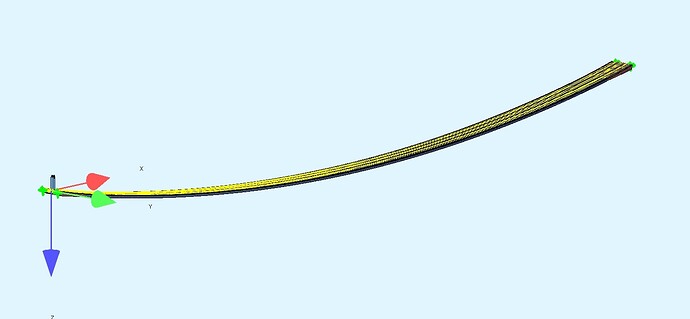Hi,
I have a problem with the dynamic analysis of a stress ribbon pedestrian bridge.
The structure consists of four main suspension cables, which are prestressed and modeled using cable elements. Precast concrete slabs with cast-in-place interlocking joints (modeled as beam elements) are suspended from these cables. Additionally, the slab is post-tensioned with two prestressing tendons (tendon elements). The bridge structure is supported by linear springs.
In my SOFiSTiK model, I performed a static analysis considering the construction stages using TH3 analysis with the CSM module. The bridge is 120.5 meters long and, in its final state, has a sag of 1.65 meters. After that, I carried out a dynamic analysis to simulate pedestrian walking across the bridge. I followed a similar approach to the one shown in this video:
Understanding and Simulating Human-Induced Vibrations on Footbridges in SOFiSTiK FEA
I used the ASE module in the same way as presented in the second example in the video, also applying TH3 analysis. However, the issue I’m encountering is that regardless of the value of the pedestrian load, I always get the same structural response. Even when I set the forcing function to a constant value of 0 kN, the analysis still results in identical displacements.
have also reviewed the example: ase.dat\english\dynamics\cable_dynamics.dat, along with other similar examples, but I have not been able to find a solution.
I am attaching the CADINP code for the moving spring, forcing function and the dynamic time-history analysis (defined in the ASE module).
+PROG ASE urs:52.1
HEAD Moving spring
MOVS 999003 TYPE BGRP FROM 2 TO 6 L0 0.5
END
+PROG SOFILOAD urs:45.1
HEAD Forcing function
LC 200 type none TITL ‘Running: three pedestrians (Seiler/Hüttner)’
node 2 type PG 3*0.8
FUNC s run t 1/2.4
END
+PROG ASE urs:54.1
HEAD Time-history analysis
ctrl spri v9 1 grp 99
CTRL CABL 0
let#bridge_L 120.5 // total bridge length in m
let#dt 0.05 // seconds time increment
let#plc 4080 // starting LC number
let#v 2.5 // m/s moving load velocity
loop#1 #bridge_L/(#v*#dt) // number of time steps to travel the bridge
let#timea #dt*#1 // time beginning of time step
let#timee #timea+#dt // time at end of this time step
let#time (#timea+#timee)/2.0 // time in the middle of this time step
let#x #time*#v // pedestrian marker location
STEP 1 DT #dt THE 0.70
SYST PROB TH3 PLC #plc ; let#plc #plc+1
MASS 0
grp - rada #rada radb #radb
grp 99 rada 0 radb 0
LC #plc FACD 1
LCC 200 // forcing function
LAUN GRP 99 dx #x[m] // pedestrian marker and loading translation
END
endloop
end
Thank you in advance.
